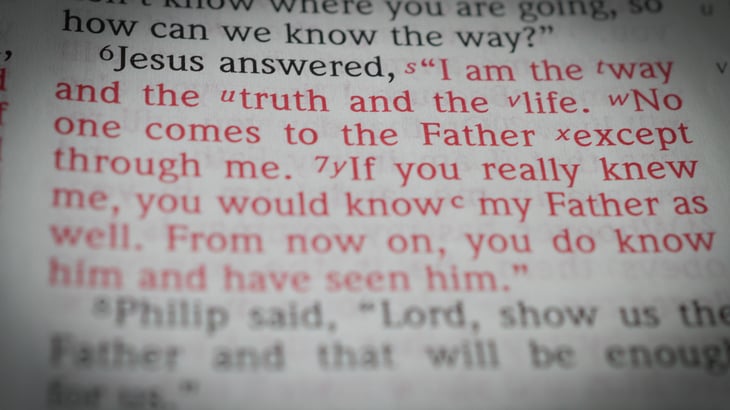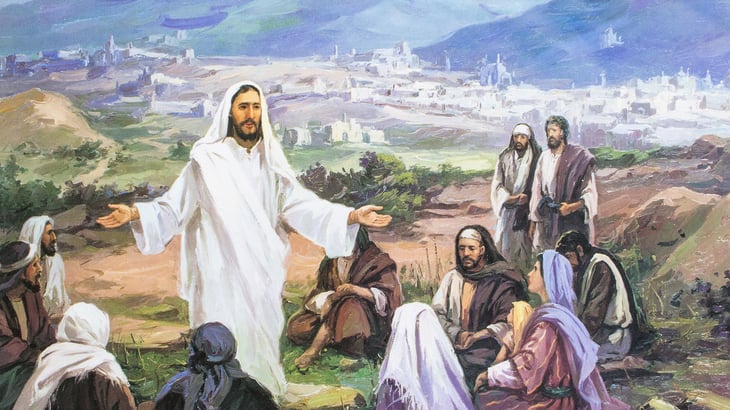Recent Posts by Phil Rigdon
Digging Deeper into Scripture: Matthew 9:9–28
A quote attributed to Benjamin Franklin regarding taxes is “In this world nothing can be said to be certain, except death and taxes.” I have yet to encounter anyone who is pleased to pay taxes. What is more, were one to survey every taxpayer in the United States, such an effort would produce an endless variety of opinions on how much taxation is appropriate and what are legitimate uses of tax dollars. Matthew, a tax collector, lived under the disdain of those from whom he collected taxes.
Digging Deeper into Scripture: John 14:1–14
Having just passed my fiftieth birthday, I am well into adulthood. I noticed several years ago that I not only look but also behave like my father. My hands are an excellent example. The shape of my fingers resembles his, as do my fingernails and wrinkles. Even more interesting is that when driving, I place my hands on the steering wheel in the same places he did. This happened naturally since he was deceased before I learned to drive. There are a myriad of other examples in both appearance and behavior. The point is that beyond my birth certificate, there is evidence that I am my father’s son.
Digging Deeper into Scripture: Matthew 28:1-10
Can you recall a time when someone assured you that something would happen, and eventually it did? Your mother assures you that continued misbehavior will result in punishment. Your friend claims that the Cleveland Browns will win the Super Bowl, and they do. Your doctor assures you that losing weight will bring down your cholesterol and sugar numbers, and so they drop.
Digging Deeper into Scripture: Exodus 17:1–7
I have seen Star Wars too many times. Wait, is that possible? When I say I’ve seen Star Wars, I mean the original movie from May 1977, which started the whole franchise. I am dating myself a little here. I was five when I first saw it (technically four, I guess.) Here’s a trivia question. Remember that Luke Skywalker’s home world was Tatooine, a desert planet. Luke was raised by his uncle Owen and aunt Beru. What was the family’s occupation? If you guessed moisture farmers or something along those lines, you are correct.
Digging Deeper into Scripture: Matthew 17:1–9
An interesting phenomenon takes place at Halloween. Mom and Dad get dressed up in costume in anticipation of attending a party or taking the children trick-or-treating. Oftentimes their costumes include a mask or face paint. When the children first see Mom or Dad in the mask or face paint, they are often afraid, especially the younger ones. Mom and Dad have changed. They sound the same, and their height and general stature are unchanged. Yet the face, the point of connection between parent and child, has changed. Children cry out and cannot be consoled until Mom and Dad remove the mask and wash off the paint. At some point in growing up, children can suspend what appears to be reality, recognizing that it is still Mom and Dad under the disguise.
Digging Deeper into Scripture: Matthew 2:1–12
When I work with couples in premarital counseling, there is a point at which we discuss leaving and cleaving, based on the creation account. “Therefore a man shall leave his father and his mother and hold fast to his wife, and they shall become one flesh” (Genesis 2:24). I stress the importance of establishing themselves as a separate family, apart from their families of origin. One question I ask is where they plan to spend their holidays, recognizing that both families will likely want them to spend the holidays with the respective sides. The point is to encourage newly married couples to make these decisions independently and as a team.
The Wise Men had to make a similar decision, although they arrived in Bethlehem some time after Jesus’ birth. We don’t know if these men were married. Because they were educated, they likely traveled with an entourage, which could have included spouses. Either way, they decided the trip was worth it.
Digging Deeper into Scripture: James 5:7–11
I am dating myself to share that I was five years old when the movie Star Wars came out. Mind you, this was 1977. At this point, there was only Star Wars without the context of The Empire Strikes Back and Return of the Jedi, let alone the prequels or the sequels. We called the movie Star Wars, not Episode IV. If you were alive then, you recall the impact the movie had on the public. It was a phenomenon for both adults and children, men and women, boys and girls. Perhaps the reason for the movie’s great success was its ability to capture the imagination of even those not enchanted by science-fiction. Star Wars was also an exercise in patience. We knew the next movie wouldn’t arrive until 1980. We simply had to wait.
Digging Deeper into Scripture: Malachi 4:1–6
There is a danger to adopting an attitude toward the end of the world that falls at one extreme or the other. One person may be so unconcerned about the return of Jesus Christ, allowing the days, months, and years of life to pass with barely a thought about sin, judgment, condemnation, and hell. Such a person is a fulfillment of the seed that is scattered among thorns, as Jesus explains in the parable of the sower (see Matthew 13). On the other hand, another person could be so consumed with the end of the world that he or she pursues questions the Bible does not answer regarding Judgment Day.
Digging Deeper into Scripture: Luke 18:1–8
Luke 18:1–8 is a parable that the Lord uses to encourage His disciples to pray persistently.
Digging Deeper into Scripture: Luke 16:1–15
When I teach on the Seventh Commandment, “You shall not steal” (Exodus 20:15), I challenge students to come up with examples of stealing beyond theft, armed robbery, burglary, and the like. I am pleased when they can come up with less obvious examples like tax evasion, falsifying time cards, being late, or breaking a promise.




















